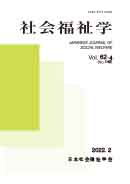Volume 62, Issue 4
Displaying 1-13 of 13 articles from this issue
- |<
- <
- 1
- >
- >|
Original Articles
-
2022 Volume 62 Issue 4 Pages 1-16
Published: February 28, 2022
Released on J-STAGE: May 21, 2022
Download PDF (565K) -
2022 Volume 62 Issue 4 Pages 17-30
Published: February 28, 2022
Released on J-STAGE: May 21, 2022
Download PDF (551K) -
2022 Volume 62 Issue 4 Pages 31-43
Published: February 28, 2022
Released on J-STAGE: May 21, 2022
Download PDF (571K) -
2022 Volume 62 Issue 4 Pages 44-57
Published: February 28, 2022
Released on J-STAGE: May 21, 2022
Download PDF (431K) -
2022 Volume 62 Issue 4 Pages 58-71
Published: February 28, 2022
Released on J-STAGE: May 21, 2022
Download PDF (475K) -
2022 Volume 62 Issue 4 Pages 72-85
Published: February 28, 2022
Released on J-STAGE: May 21, 2022
Download PDF (575K) -
2022 Volume 62 Issue 4 Pages 86-100
Published: February 28, 2022
Released on J-STAGE: May 21, 2022
Download PDF (761K)
Spring Symposium
-
2022 Volume 62 Issue 4 Pages 101-104
Published: February 28, 2022
Released on J-STAGE: May 21, 2022
Download PDF (287K) -
2022 Volume 62 Issue 4 Pages 105-108
Published: February 28, 2022
Released on J-STAGE: May 21, 2022
Download PDF (806K) -
2022 Volume 62 Issue 4 Pages 109-112
Published: February 28, 2022
Released on J-STAGE: May 21, 2022
Download PDF (436K) -
2022 Volume 62 Issue 4 Pages 113-117
Published: February 28, 2022
Released on J-STAGE: May 21, 2022
Download PDF (426K)
Book Review
-
2022 Volume 62 Issue 4 Pages 118-120
Published: February 28, 2022
Released on J-STAGE: May 21, 2022
Download PDF (229K) -
2022 Volume 62 Issue 4 Pages 121-123
Published: February 28, 2022
Released on J-STAGE: May 21, 2022
Download PDF (235K)
- |<
- <
- 1
- >
- >|
